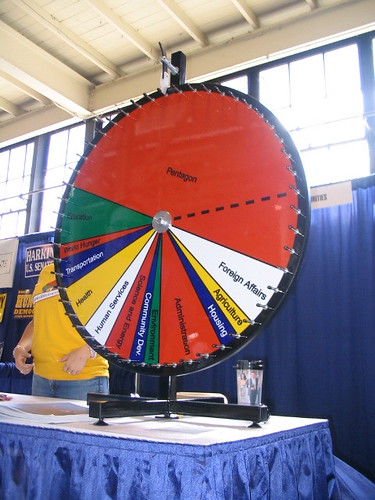Citing “several sources familiar with her thinking,” Alex Isenstadt reports at Politico today that former First Lady Christie Vilsack is leaning toward challenging five-term incumbent Steve King in Iowa’s fourth Congressional district. Isenstadt notes that Vilsack met with Democratic Congressional Campaign Committee Chairman Steve Israel last week in Washington. Israel reportedly promised Vilsack that he would support her if she runs against King, but that he would “unequivocally” back Representative Dave Loebsack if she runs against him in the Democratic primary to represent the second Congressional district.
Isenstadt’s piece doesn’t clarify whether Israel promised the DCCC’s financial backing for Vilsack in an IA-04 race. The DCCC officially supports all Democratic nominees for the U.S. House, but usually only spends money on behalf of a few dozen candidates. The 39 counties in the new fourth district (map after the jump) are in five different media markets, although most of the population could be reached by advertising in just Des Moines, Sioux City and Mason City.
Last week the Des Moines rumor mill suggested Vilsack had been calling state legislators in the second district. According to Isenstadt, she has discussed a possible race against King with some Democrats in IA-04:
Jan Bauer, chairwoman of the Story County Democratic Party in Ames, said she spoke with the former first lady several weeks ago and that Vilsack raised the possibility of challenging the conservative congressman.
“I’d be surprised if she doesn’t do it,” Bauer said in an interview.
A campaign in IA-04 would be an uphill climb for any Democrat, although Vilsack would start the race with unparalleled name recognition and the capacity to raise significant funds. King has never been a major-league fundraiser; his latest FEC filing indicated that he had $142,610.38 in his campaign account as of March 31.
Share any relevant thoughts in this thread. I think a campaign in IA-02 would give Vilsack her best chance of winning a seat in Congress and holding that seat for more than two years. On the other hand, I would enjoy seeing a serious and well-funded challenge to Iowa’s most embarrassing politician of my lifetime.
Final note on IA-02: Loebsack’s latest FEC filing showed $121,874.47 cash on hand as of March 31. Representative Tammy Baldwin of Wisconsin headlined a fundraiser for Loebsack in Iowa City over the weekend. Next month, Representative Bruce Braley (IA-01) and Senator Tom Harkin are hosting a fundraiser for Loebsack in Scott County, while Representative Leonard Boswell (IA-03) plans to hold a fundraiser for Loebsack in Jasper County.
UPDATE: U.S. Secretary of Agriculture Tom Vilsack told Democratic state senators on Monday that if his wife runs for Congress, “it will be a holy war.” That suggests she is leaning toward challenging King, rather than forcing a Democratic primary in IA-02.
SECOND UPDATE: From Bret Hayworth’s blog on April 19:
This morning, Iowa Republican Party Chairman Matt Strawn was traveling through Northwest Iowa to talk politics, including making a stop to talk with me at the office. He was raring to talk about the possibility of a King-Vilsack matchup.
“She can try and take Steve King on, but I think that will be a great opportunity for Republicans to mobilize. A presidential year, having a very highlighted race in Northwest Iowa, is a guarantee that we are going to be able to turn out every Republican and conservative vote that would benefit a presidential candidate, all the way down the ticket,” Strawn said.
“Not only does Mrs. Vilsack not have any natural connection whatsoever to Northwest and north central Iowa, but culturally is out of step. She’s someone that has an affiliation with some organizations that would certainly inflame a lot of the pro-life voters in this area… Congressman King has a national following as well, and he would have the ability to call in all sorts of resources to aid the fight.”
THIRD UPDATE: Matt Paul, a former staffer for Governor Tom Vilsack, told the Des Moines Register on April 19,
“I can confirm that Christie and Tom Vilsack have completed a transaction and are moving to Ames,” said Matt Paul, a Democratic strategist who was a staffer for Tom Vilsack when he was governor. […]
Paul declined to offer further details about Christie Vilsack’s political intentions, but said: “There will be an announcement very soon.”
FOURTH UPDATE: A rare moment of agreement between Governor Terry Branstad and me:
“Well, she’s never lived in northwest Iowa and it’s a heavily Republican area,” Branstad said this morning. […]
“I think in southeast Iowa she would be a pretty formidable candidate where she grew up,” Branstad said. “I think in northwest Iowa she’d be a fish out of water.”
Continue Reading...

